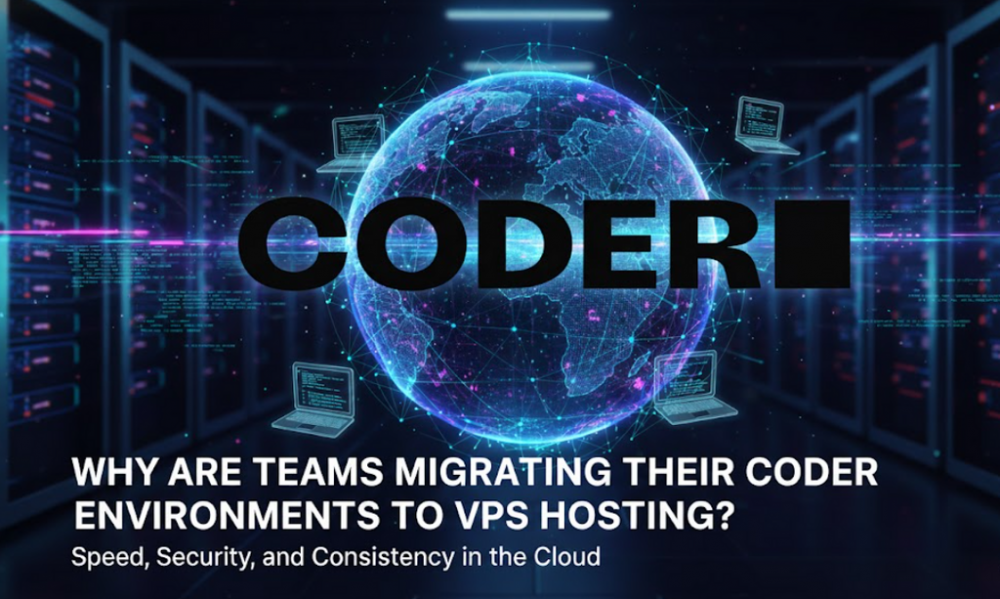
In 2026, The Modern Software Development Cycle Has Moved Beyond The Local Laptop. Large Enterprises, Fast-growing Startups, And Even Freelance Teams Are Abandoning The Complexities Of Local Setup In Favor Of Cloud-based Development Environments Powered By Tools Like Coder (the Platform That Runs VS Code In The Browser).
This centralization solves problems of consistency and security, but it introduces a critical infrastructure question for DevOps: Where do we host these powerful remote environments?
The answer, surprisingly, is a decisive migration away from generic public clouds to specialized, high-performance VPS (Virtual Private Server) hosting.
The Bottleneck: Why Local Development Had to Die
Before we discuss the infrastructure solution, we must understand the three core problems Coder was designed to fix—problems that ordinary hosting often recreates:
-
Problem of Slowness: Resource-intensive tasks (like compiling massive projects or running complex machine learning models) overwhelm standard developer laptops, causing hours of wasted time.
-
Problem of Drift: Every local machine is different. This leads to the famous "it works on my machine" crisis, where code that runs on one laptop breaks on another due to dependency and version conflicts.
-
Problem of Security: Sensitive source code and proprietary keys are downloaded directly onto the local machine, posing a major risk if the laptop is lost, stolen, or compromised.
The Coder platform solves these by centralizing the environment. But to deliver the performance Coder promises, it needs a guaranteed, stable foundation.
What is Coder?
The Coder platform is a sophisticated open-source tool that allows organizations to host their entire software development environment (including the operating system, code dependencies, and the popular Visual Studio Code editor) on a powerful, centralized remote server. Developers then access and use this powerful environment instantly through their web browser.
It fundamentally acts as a remote workspace orchestrator, ensuring every developer accesses the same powerful, pre-configured, and secure computing resources, effectively separating the developer's device from the coding environment.
The Infrastructure Shift: Why VPS Beats Generic Cloud
When hosting the Coder platform, DevOps teams typically evaluate traditional Public Cloud VMs (Virtual Machines) versus a specialized VPS. Here is why high-I/O VPS hosting is winning the debate:
A. Cost Predictability vs. Cloud Sprawl
The public cloud offers flexibility but comes with a massive cost complexity. Idle Coder environments, storage snapshots, and egress fees can balloon the infrastructure budget unexpectedly.
-
VPS Advantage: Hosting a coder vps offers a fixed monthly price with dedicated resource allocation. This makes budgeting simple, predictable, and significantly reduces the "cloud sprawl" of unused, expensive resources.
B. Dedicated Power vs. Resource Contention
Coder environments are extremely resource-hungry. They require consistent CPU, high memory, and, most importantly, blazing-fast disk I/O.
-
VPS Advantage: Specialized providers guarantee dedicated CPU and RAM to each VPS instance. This eliminates the "noisy neighbor" problem found on many shared cloud VMs, ensuring the developer's remote session is consistently lag-free.
-
NVMe Speed: High-quality VPS providers utilize NVMe SSDs. This is critical because development workflows require constant reading and writing of small files. NVMe provides the high IOPS (Input/Output Operations Per Second) needed to make the remote terminal feel local.
C. Full Control vs. Management Overheads
For DevOps, control is paramount. While generic cloud provides control, it often requires complex integrations.
-
VPS Advantage: A VPS grants root access (full administrative control) over the environment. This allows DevOps to quickly install custom kernels, specific container runtimes (like Docker), and configuration management tools (like Ansible or Terraform) without battling restrictive cloud policies.
The Cloudzy Solution: Specialized Hosting for Coder
Teams migrating to a VPS look for reliability and specialization. Cloudzy meets this need by optimizing its servers specifically for the performance demands of Coder and modern development.
Instant Consistency via Specialized VPS
The biggest time-saver comes from pre-configured, high-performance Coder VPS instances. Developers and DevOps teams can leverage templates that are already optimized for Linux, containerization, and the specific latency requirements of remote VS Code, moving straight to deployment.
Security and Global Access
For global teams, Cloudzy provides strategic data center locations and dedicated resources, ensuring low latency for developers worldwide. Furthermore, a self-hosted environment on a private VPS ensures that the source code stays isolated and secure, satisfying the strictest enterprise security requirements.
Financial Flexibility for the Global Team
Managing international payments for software teams can be complex and expensive. Cloudzy supports the modern global developer economy by offering the convenience to buy vps with crypto. This option simplifies procurement, reduces international transaction fees, and provides financial flexibility for remote teams and freelancers worldwide.
Conclusion: The New Standard for Development Infrastructure
The migration of Coder environments to specialized VPS hosting marks the final evolution of the "remote-first" workflow.
It’s no longer enough to just host your code remotely; you must host it on infrastructure that guarantees consistency, eliminates lag, and simplifies costs. By choosing a dedicated, high-performance VPS foundation, development teams stop troubleshooting their environments and start focusing on shipping code faster, more securely, and more predictably than ever before.
This strategic shift from chaotic local setups to disciplined, high-powered centralized VPS infrastructure is the new standard for serious software engineering in 2026.

